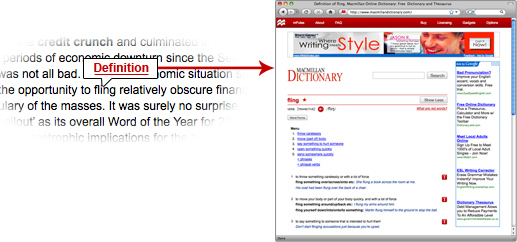Read
the text, PRACTICE THE PRONUNCIATION of the words and try to
summerize what you have read about.
TIPS
»
In this step practising pronunciation is more important than
understanding the text very well. So don't spend much time
on finding out the meaning of any single word at the moment,
but always make sure of its right pronunciation.
»
To
listen to the pronunciation of a word, double click on any word
or mark more than one word with the cursor, then click on "Definition",
and in the opening window choose the appropriate word and click
on the  icon.
icon.

»
Listen and repeat the words and read the text aloud as a whole
some times.
Bully
for "bully" Orbán's decision to stand up to the IMF
and EU brutes (Adam LeBor )
Extracts
for learning English, you can find the article here:
Politics.hu July 26, 2010
http://www.politics.hu/20100726/bully-for-bully-orbans-decision-to-stand-up-to-the-imf-and-eu-brutes
The original article is only available to subscribers of
the Times here:
The Times July 26, 2010
http://www.thetimes.co.uk/tto/opinion/article2658958.e
The howls of outrage are echoing from Brussels to Washington
DC. Like the simian slaves in Planet of the Apes, Hungary has
uttered the forbidden word: No.
Viktor Orbán, the Prime Minister, has rebuffed the demands
of the IMF and the EU for more budget cuts and austerity measures.
The moneycrats went home muttering about collapsing currencies
and fiscal irresponsibility. To which Budapest's glorious
answer was: God speed. The forint, Hungary's currency, slid,
recovered and slid again but the country is holding firm.
Instead of cutting services and welfare, the Government will
go for growth by slashing taxes, whitening the economy and
simplifying Hungary's byzantine business environment.
Of course, after the 2008 20 billion EU bail-out package,
the EU and IMF have a right to negotiate over Hungary's financial
plans. And after the IMF-induced privatizations of the early
1990s turned much of this region into an economic wasteland,
Hungary has a right to stick to its guns.
But there is a wider issue at stake here: national sovereignty,
especially of smaller nations. In today's globalized world,
and a streamlined Europe where Brussels and Strasbourg engage
in an unprecedented appropriation of political and legal power
by stealth, national sovereignty has somehow become a dirty
word. Our destinies may be increasingly shaped by globalised
financers and multinational institutions, but I don't remember
anyone voting for this process, or even being given the option.
Ironically, these supranational bodies use the same tactics
as the Communists in postwar Europe - stealthily slicing away
independence and sovereignty until nobody notices that it's
all gone.
But now somebody has. Admittedly, Mr. Orbán, Hungary's pugnacious
premier, seems an unlikely people's tribune. Since his centre-right
Fidesz party won a two-thirds majority this year, his government
has rammed a series of bills through parliament that, critics
say, have packed formerly independent institutions with party
placemen and threaten the checks and balances of democracy.
Opposition politicians say that independence of the media,
the constitutional court and the state audit agency are all
under threat, although few doubt that a shake-up was needed
after eight year of sloth and corruption under the Socialists.
The joke now in Budapest is that democracy has been replaced
by a "Viktatorship." Yet perhaps it takes a Viktator
to stand up to the IMF and the EU.
Not content with telling the financiers where to go, parliament
has just passed a stringent tax on the banks, causing fury
and fear among Europe's financiers: fury that Hungarian banks
will have to pay a levy of 0.5 per cent of bank assets as
they stood at the end of 2009, and fear that this could set
a dreadful precedent, with Hungary's neighbors quickly following
suit. Let's hope so.
The bank tax is well deserved. A good part of Hungary's economic
travails can be blamed on the bankers. An incredible 70% of
all domestic and business lending is denominated in foreign
currency, much of it in Swiss francs. During the boom years
the bankers extended easy and cheap credit, in exotic currencies,
to virtually anyone who asked, even though the borrowers were
paid in forints. Consumers were hustled into credit packages
with risks they barely understood, but which were, however
the markets behaved, guaranteed to bring hefty profits for
the banks. Mortgages that cost 100,000 EU are now debts of
perhaps 140,000 EU, with little if any hope of ever being
repaid.
So hooray for Hungary, standing up to the IMF and EU bullies.
In 1956, Hungarians rose against Soviet tyranny, hoping to
trigger a chain reaction. That didn't happen, but perhaps
Hungary's stand against capitalist despots will spark one
this time.
|
 STEP
1 »
STEP
2 »
STEP
1 »
STEP
2 »